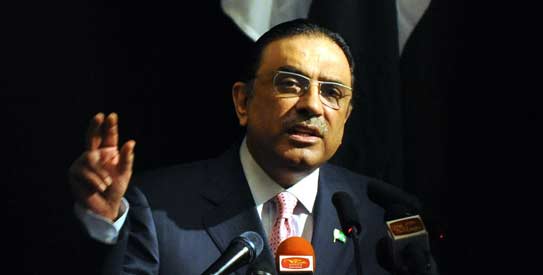
ISLAMABAD: The stage was set for President Asif Zardari to become the first head of state to deliver a record fifth address to a joint sitting of the National Assembly and Senate on Saturday after the Presidency successfully persuaded the Muttahida Qaumi Movement to step back from its threat to disrupt the session.
The People’s Party has built up the occasion as a democratic landmark in the country’s chequered history.
The one-day joint sitting will meet a constitutional obligation for a presidential address at the start of a new parliamentary year while another joint sitting is expected to be convened next week to review strategic relationship with the United States in light of recommendations of a parliamentary committee on national security.
But the MQM, which is a part of the PPP-led coalition governments at the centre and Sindh, came out with a threat earlier on Friday -- the last day of National Assembly’s fourth parliamentary year -- that it would not allow the event to pass off smoothly as it protested for the second day over widely complained menace of “bhatta-khori”, or extortion, in Karachi.
The MQM shouted the National Assembly to a standstill and threatened to disrupt the president’s address, apparently risking its place in the coalition government.
The party lawmakers had staged only a walkout from the house on Thursday, but on Friday they stayed inside the house and their loud shouting for about 50 minutes disrupted the entire proceedings after the question hour.
The tumult ended only after the National Assembly session, which began on Wednesday, was prorogued. And one MQM member, Wasim Akhtar, who led the day’s protest, delivered a menacing threat: “If notice (of our complaint) is not taken, we will not allow tomorrow’s address. We will protest.”
That was a departure from the party’s previous threat that it could consider only boycotting the joint sitting.
Nineteen or 20 MQM members present, out of a total of 25, continued shouting slogans like “Bhatta-khori bund karo” (stop extortion) and “Sindh government hae hae” (down with Sindh government) and did not seem impressed by a proposal from the Pakistan Muslim League-N (PML-N) – to which the PPP agreed -- to form a bipartisan house committee for investigating the situation in Karachi and pinpoint responsibility for action.
Opposition protests during presidential addresses to parliament have not been uncommon, but speeches had gone on in the face of loud or rowdy protests against then presidents Ghulam Ishaq Khan and Farooq Leghari in the 1990s and against president Pervez Musharraf in 2004.
But it is the first time in the country’s parliamentary history that a party had threatened such a course against its own government, raising speculations that the move could jeopardise MQM’s position in the coalition.
It has already quit, and then rejoined, twice over the past two years after differences over other matters.
The PPP refrained from reacting to the move on Thursday. And on Friday its spokesmen, including chief whip and Religious Affairs Minister Khursheed Ahmed Shah, said they agreed with the MQM’s concerns and wanted to negotiate a “roadmap” to tackle the issue.
But a member of the Awami National Party, another government ally, alleged that the Muttahida’s outbursts were aimed at undermining his party’s efforts to increase space for itself in Karachi. The legislator drew thunderous applause when he said every Pakistani had a right to live and earn livelihood in Karachi.
It was a PML-N member from Punjab, Rohail Asghar, who first proposed a house committee to study the situation in Karachi while the party’s most senior member present in the sitting, Sardar Mehtab Khan, endorsed the call and called for de-weaponising Karachi and what he called an “operation at the administrative level” to deal with the menace that he said had made Karachi its hostage for years.
Mr Khursheed Shah agreed, saying his party too wanted de-weaponisation, exemplary punishment for “bhatta-khors” (extortionists) and formation of an inquiry committee.
Sheikh Waqas Akram, a minister of state from the Pakistan Muslim League-Q, urged the MQM to identify those responsible for extortion and suggested that some young parliamentarians, instead of the old ones susceptible to expediencies, be included in the proposed committee.
But persistent shouting did not permit any conclusion to be reached. Deputy Speaker Faisal Karim Kundi read out the presidential order proroguing the house.












































Dear visitor, the comments section is undergoing an overhaul and will return soon.